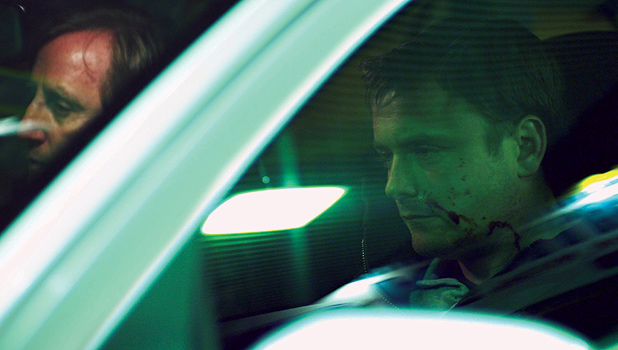My attention was drawn to Ben Wheatley due to the recent release of A Field in England; an exceptionally strange film that fits snugly into the genre of 17th century psychedelic war-drama. Talk about a film standing in its own field…ahaha. *ahem.* Anyway, intrigued by this young up-and-coming director, I decided it was time to delve into the odd, oppressive world of Wheatley.
Kill List is Wheatley’s second feature-length film and certainly his most well-known. It follows Jay (Neil Maskell), a slightly gritty family man, who is starting to be ground down by the twin pressures of his marriage and the financial debt looming over his head. An opportunity presents itself however, when his old friend Gal (Michael Smiley) and his girlfriend come over for what is to be a painfully awkward dinner. We then learn that Jay and Gal have a shared past in the assassination business, and that a new hit has come up; a job for which Jay comes highly recommended. After he reluctantly accepts, the film follows Jay and Gal’s execution of the job, which leads the duo down a rather dark trail…
Sounds like a relatively bog-standard British crime thriller, right? Well as it turns out, Kill List is one of the most inventive, astonishing and downright harrowing films I have seen in recent years. Trust me, there’s no hyperbole here. From midway through the film I was leaning forward, entranced, my mouth slightly open in disbelief. By the time the credits rolled, I felt like I had been hit by a train. Five minutes after the credits had finished rolling, I was still staring at the screen and saying ‘fuck’ under my breath.
Why is it so shocking? Well, the violence for one thing. Some of the scenes in Kill List are just downright nasty, but not in a voyeuristic or stylised way. The setting is just so relatable, with recognisable two-up two-down houses, typical English cul-de-sacs, and Neil Maskell cuts an utterly believably character. When violence does erupt therefore, it is just very close to home, and executed with an ethos of savagery-over-style that makes you believe that this could happen right on your front doorstep. I would like to add the disclaimer that if you are at all squeamish, THIS IS NOT FOR YOU. Wheatley doesn’t want us to look away from the barbarous acts he portrays, and he has built a film so compelling around it, that it pretty much feels like he’s holding your head to the screen, forcing you to watch.
More importantly however, Kill List shocks because of its structure; namely, its insane defiance of genre expectations. This starts off as a kitchen-sink domestic drama. We are pulled into a world of marital squabbles, drunken bonding and bedtimes stories. Then, a third of the way through the film, it turns into something completely different: a hard-boiled, murky crime thriller. And then… oh, and then… let’s just say it changes into something rather different entirely. This is an acrobatic film, using every tool at its disposal to ease you in and get you comfortable with the characters, providing you with some gripping intrigue, and only then, once you realise it’s got you in its unforgiving talons, it throws the whole goddamn playbook out of the window.
Ben Wheatley has proved himself to be a master manipulator through his form, but the technique isn’t even cheap, because everything else in Kill List stands up to scrutiny. The cinematography is novel and effective, using abrupt cuts and black screens to give a rough-edged, erratic feel that suits the content perfectly. All of the roles are played competently and convincingly, giving the impression of an extremely solid film.
You can clearly see the influence of Shane Meadows in Wheatley; this is a film that owes quite a lot to Dead Man’s Shoes’ ruddy bleakness. But there is much more anger and anarchism in Wheatley’s approach to filmmaking; this is someone who is not afraid to take massive liberties with conventions in order to get his visceral point across. This becomes even more apparent in A Field in England which will be the subject of my next instalment…
